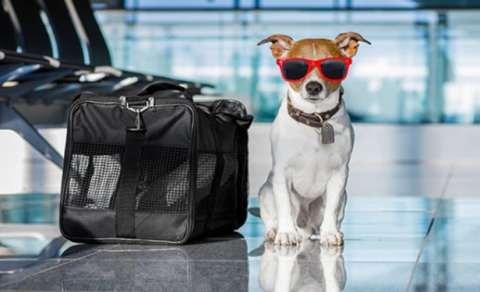Delta Cargo Teams Up with CarePod to Provide Smart Pet Travel

More than two million pets and other live animals are transported by air every year in the U.S. While the U.S. Department of Transportation offers guidelines, each airline establishes its own company policy for the proper handling of the animals they transport.
In April 2000, the U.S. Congress passed the Safe Air Travel for Animals Act. Many airlines responded to this law by implementing restrictions on accepting pets as cargo. United Airlines is currently the only domestic airline that will cargo-transport brachycephalic, aka flat-faced, short-nosed dogs such as bulldogs and pugs who are prone to respiratory issues.
In an attempt to provide a better experience for pets and their owners, Delta Cargo has entered into an exclusive long-term partnership with CarePod, a Singapore-based pet technology start-up.
“Our goal is to transform the future of pet travel, and to be able to work with Delta in delivering a better experience for its customers is an exciting step,” explained Jenny Pan, founder and CEO of CarePod.
There are few details currently available on exactly how CarePod and Delta will work together, but Delta Cargo states that CarePod’s range of smart pet travel products and services will help the airline better transport and monitor pets throughout their journey.
Delta Cargo already has temperature-controlled holding areas and vehicles in numerous locations and overnight kenneling services. The airline’s GPS tracking for pets will allow customers to receive real-time updates.
“Demand for pet shipments is strong and we are always looking for ways to create a best-in-class travel experience for pets and their owners,” said Shawn Cole, vice president of Delta Cargo.
Delta says that its team of specialists continuously review processes and policies to identify areas of improvement to ensure the safety and health of pets. The airline has specially trained ground handlers who take care of pets at every step of their journey and recently appointed a staff veterinarian.
Delta, United, Jet Blue, American and Spirit Airlines have all recently implemented or announced requirements for passengers with emotional support animals to submit documentation in advance. Forms required include certification from a licensed mental health professional, certification from a licensed veterinarian and a liability form. These documents must be received at least 48 hours prior to the flight.
According to the Humane Society of the United States, the Welfare of Our Furry Friends (WOOFF) Act was recently passed as part of the Federal Aviation Administration reauthorization bill. Introduced after the unfortunate death earlier this year of a French bulldog who a United Airlines flight attendant insisted be put into an overhead bin during travel, the WOOFF Act bans the placement of pets in overhead compartments.
The bill also includes a provision that calls on the Department of Transportation to set rules for service and emotional support animals.
While it’s rare for event organizers to encounter situations involving animal air travel, it’s not out of the realm of possibility. If you are traveling with an animal or assisting anyone traveling with an animal, be sure to check your airline’s policy in advance. Fees and availability for transporting animals within the main cabin of the plane vary and documentation will be required for that as well.
See how each airline stacks up in this reader survey from ThePointsGuy and Airfarewatchdog.com: The Best Airlines for Pet Travel.
Don’t miss any event news! Sign up for any (or all) of our e-newsletters HERE & engage with us on Twitter, Facebook, LinkedIn & Instagram!


Add new comment